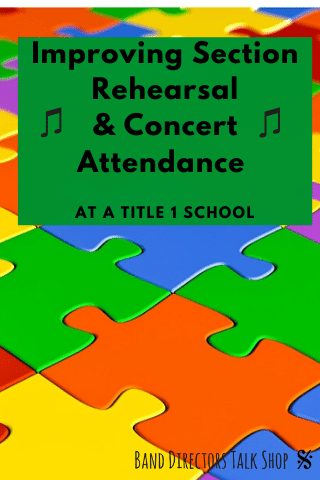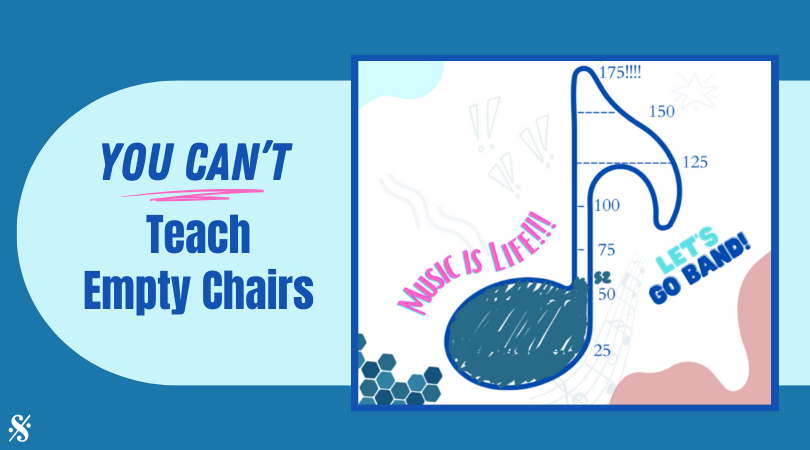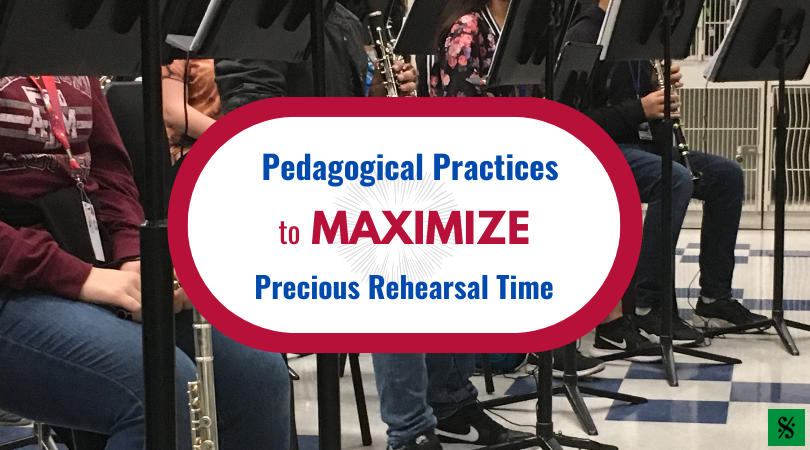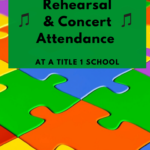In my years of teaching in Title One Schools with a high range of diversity, I have found one of the biggest struggles and potential greatest rewards to be getting students to participate in before/after school section rehearsals. I have also talked with a large number of teachers in similar situations that find just getting the students to concerts and other major performances to be a huge stressor.
I have had many trial and error attempts to reach these kids and increase their attendance and involvement. These are the things I have found that work:

Parent Contact
I know this seems like the obvious answer and, for 50% of the students who have attendance issues, it likely may be all that is needed. And though this sounds easy enough, if you have taught for very long especially in a Title One or largely minority school, you will know this is a really tough one.
Many parents have phones that are not in service…frequently. When they are working, the voicemail box is full. Sounding familiar? Often parents won’t answer the phone if it’s from a school number.
When I have to call a parent, I often have the student do it. If the parent doesn’t answer, I make them leave a message. You never want a parent worried about a school call with no message (as a parent, that is always terribly scary and you imagine the worst. EVERY. TIME.) I then usually have them call on their own (student’s) personal cell. It’s amazing to me that the kids will frequently have a working phone even when the parent’s phone says it’s out of service. Also, when a parent sees a call from their child’s phone…they answer. I will also let them text a parent, if they know that parent is at work. They simply show me to confirm it was sent.
Students are very smart, if they can call a wrong number to stay out of trouble, they will. These are usually the students whose parents will be the most supportive if you ever successfully contact them.
I realize, again from experience, that there is another group of students that phone calls will make zero difference. At this point though, you have already reduced offenders to a much smaller and more manageable number. For this reason, this year we have taken a one-two punch approach to every student missing a section rehearsal.
Student Assignments
When a student misses a section rehearsal, the very next day they have to make a parent call and then must complete a short writing assignment that consists of explaining why they were absent and why the rehearsals are important.
We do this because for another group of students, calling your parents just doesn’t really matter. The parent yells at them for 30 seconds on the phone and then it’s over. Back to life as usual (or for many, they are so used to the yelling, that it didn’t even have an impact). We decided this had little to no teeth and the students didn’t have to take even a heartbeat to think about their absence. Once we began having the students take time out to complete a written assignment that forces them to reflect on the situation, we started seeing students in the very next morning to make up the missed rehearsal. We also saw attendance shoot up to well over 90%.
We understand that every student messes up sometimes and forgets to set their alarm or a parent leaves early to work without warning, but this is a one-time thing. Now we can focus on the less than 10% that still aren’t attending their rehearsal. This is tricky for us because we now have 3 performing groups having section rehearsals simultaneously 5 days per week before and after school. The student accountability has gone way up simply because the kids are thinking about it differently.
Once they get to a rehearsal, they have a good time. They see how much help they receive and how different the attention is from full band with 70 students. Then these rehearsals become a thing of pride and joy (even at 7am). Coming soon will be a follow-up with the positive way we have turned the students into the ones holding each other accountable.
Concert Self-Evaluation
(I cannot take credit for this idea, I adjusted it from another music teacher I worked with in a previous life.)
Concert self-evaluations help make the students more self-aware and again, make them reflect on the importance of the concert and their part in the performance. And, best of all, they make principals happy because concerts are no longer a dreaded participation grade.
Participation grades have long been under fire from principals because they really can’t be justified and therefore the principal can’t support them when a parent decides to push the subject. The truth is, they have nothing to do with mastery of the material. Though there really isn’t a perfect way to test mastery in a concert by an individual, a self-reflection can get you very close. You are also able to really tie in the TEKS (state curriculum expectations) that apply to concert performances. Talk about happy administrators!
For the students, this self-evaluation makes them take a big look at their performance and behavior at concerts. We always read them to the students before the first concert and explain what they will be giving themselves grades for. The day after the concert, students are given time to reflect and complete the sheet during class. Students who were absent have to give themselves 1 point in each box and their answers to the written responses always involve why they weren’t there. It gives us insight into why they were absent before we even have to talk to them. Often after filling out one of these for a concert absence, there is never another issue.
More details about the concert evaluation will come in another post, but some examples are “I wore the correct attire” I played the music at a very high level” etc.
Concert Replacement Grade
If you, like I, have a principal that is adamant that you let students repair grades even when they missed a concert, then you have an opportunity to encourage students to attend the concert one more time with an assignment. We like to make ours in the form of a personal narrative or opinion essay tied to the music we were playing. The more they have to think for themselves and develop a story or opinion, the better. This also prevents us from having to check for plagiarism. We have strict requirements for formatting and, of course, grade it in a way that would make our English teachers proud.
We are not afraid to give the paper back for refinement and editing. If the student was absent without an excusable situation, they can only receive up to a 70%. If they choose not to do the assignment, my administration feels I have done more than my due diligence in the situation and I have sufficient documentation for those students to receive a very low grade. I love knowing that I will have administration support and never have to worry about keeping myself “covered”.
Though I know many teachers that are concerned because they have many students in their Low SES, minority groups missing concerts, I have found that I can reduce absences to 2% or less of the students in my program. Having moved to a new school, I have had the chance to test my ways on a new population of students and have found it to be even more successful at my new digs. I always find ways to continue to tweak things as I go along to fit each situation, but I don’t have to spend a great deal of time on it. This allows me to put my focus on the music and the fun in performances instead of on threats and negative consequence.
Annette Mitchell is an active educator and clinician, who also likes to dabble in music education research. She is in her 16th year of teaching middle school band all 16 years of her career have been in Low SES schools. When she is not teaching fundamentals and encouraging students to reach beyond their own expectations, she is blessed work at her primary full-time job of being a wife and mommy to a toddler.
This is the third post in a series of posts on “Teaching in a Low SES School” by Annette Mitchell. Read the first post here. Read the second post here.
Related Reading:
Music Education Resources to Follow
Contagious Engagement in Band
If I Knew Then What I Know Now
Don’t forget to like us on Facebook!
Learn. Share. Inspire.
BandDirectorsTalkShop.com






Leave a Reply
You must be logged in to post a comment.